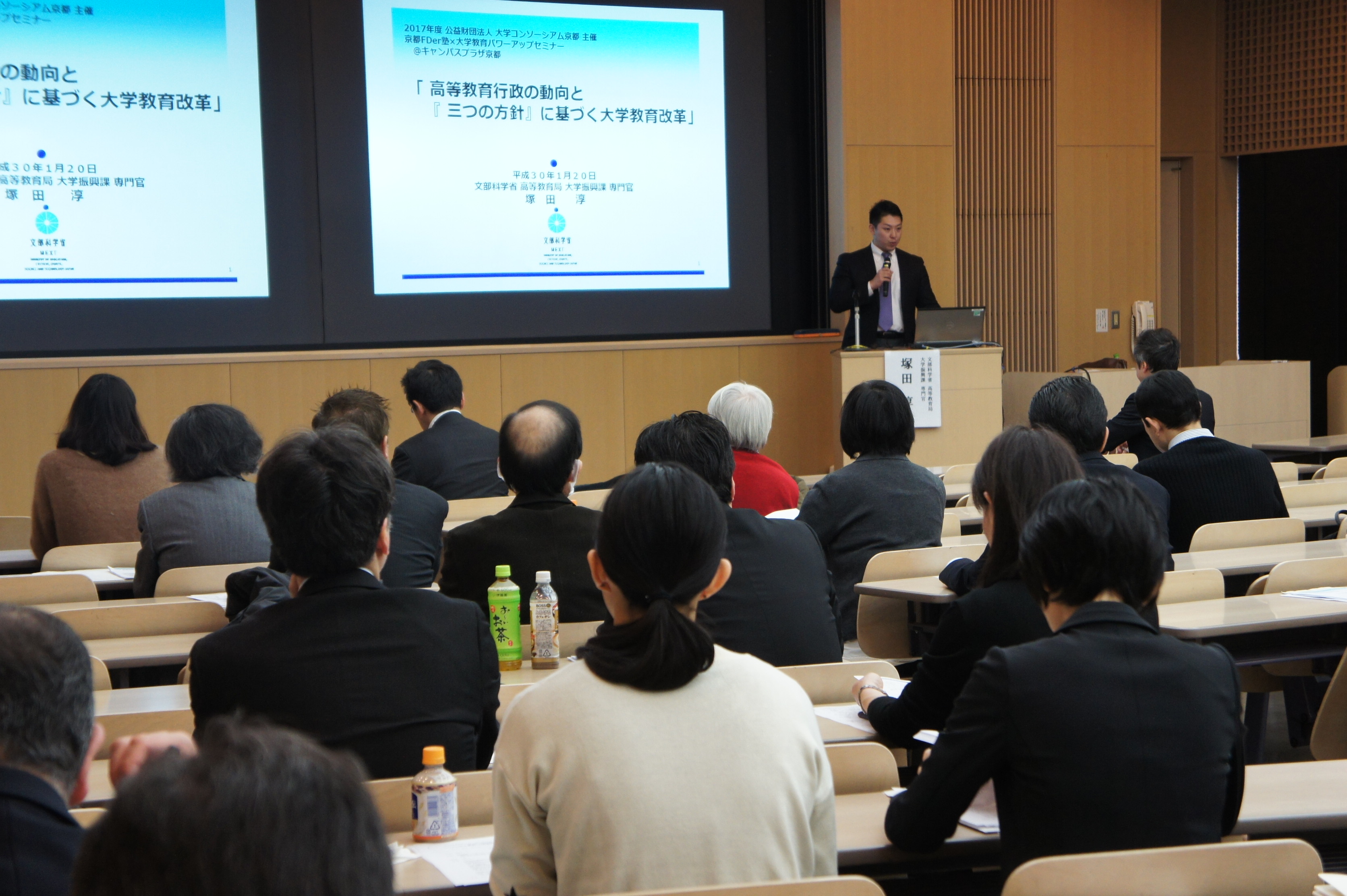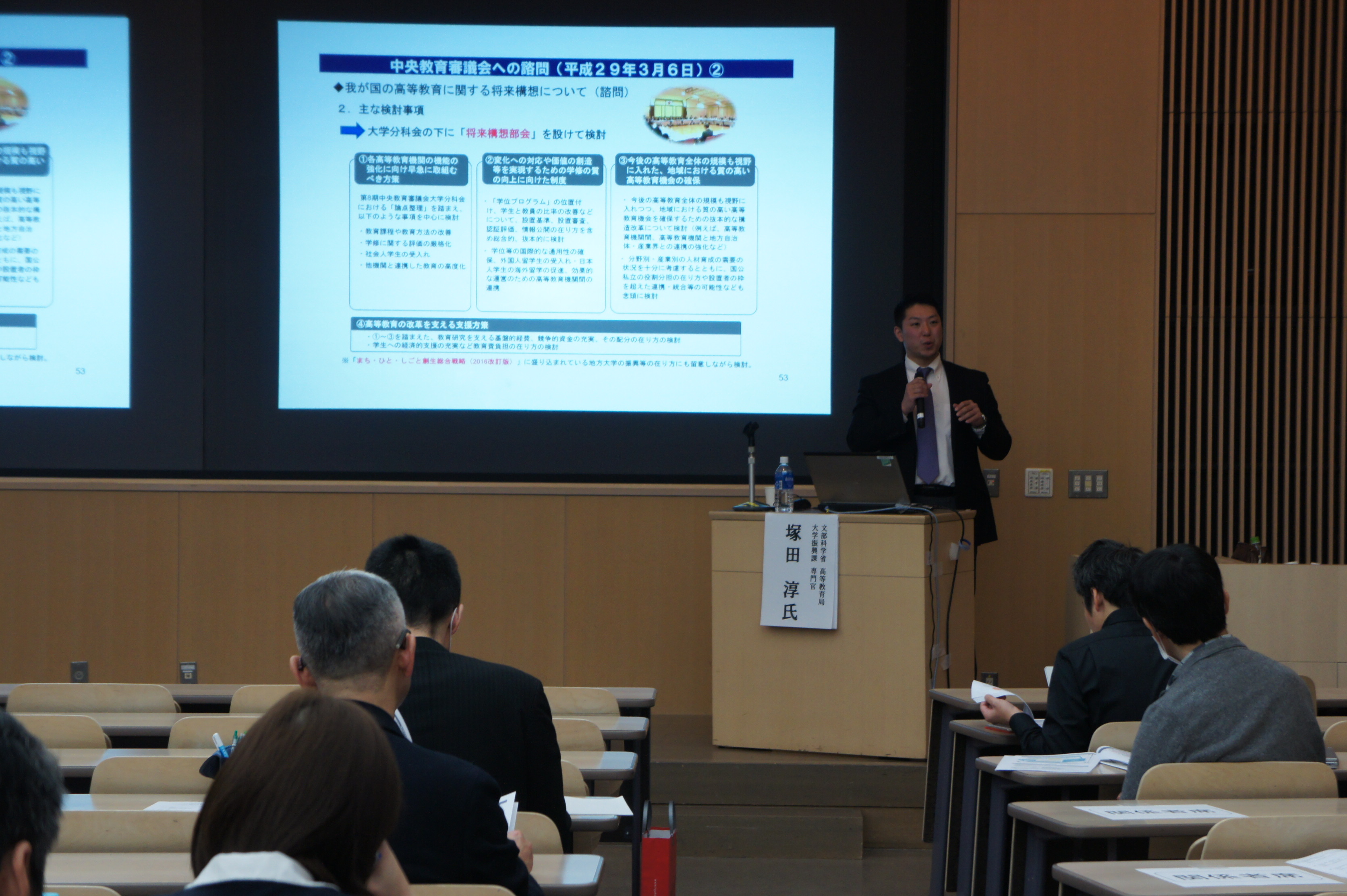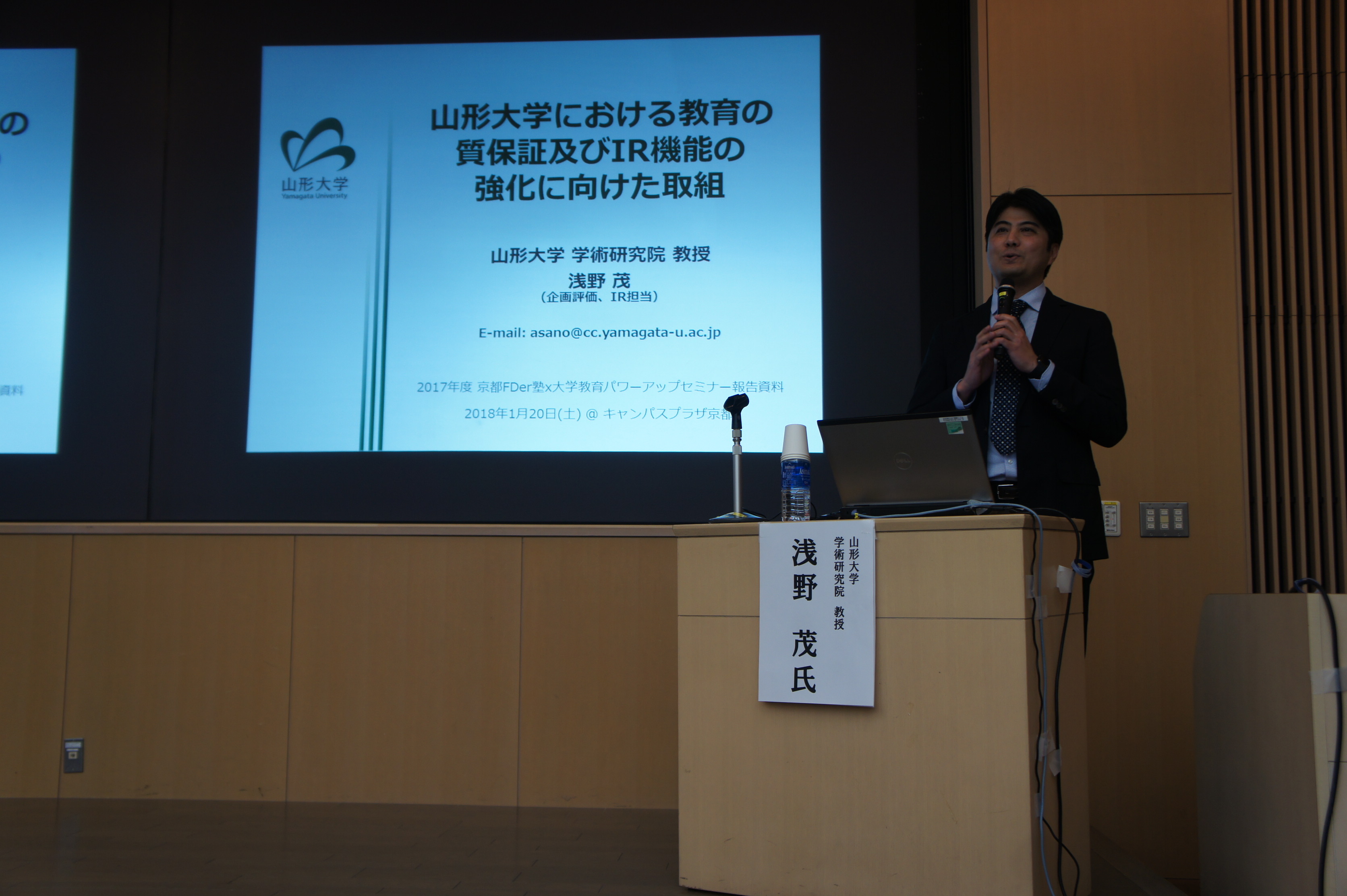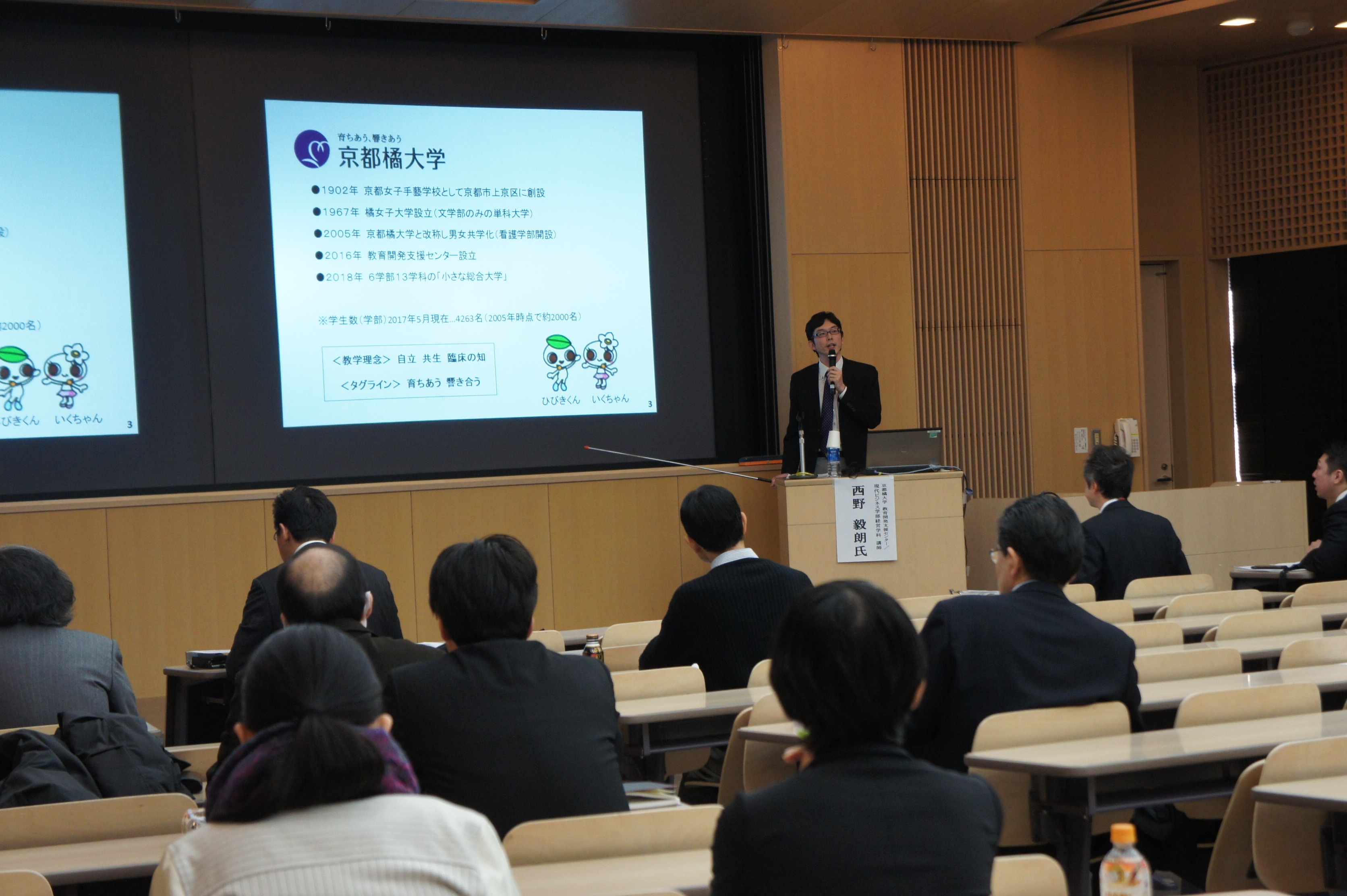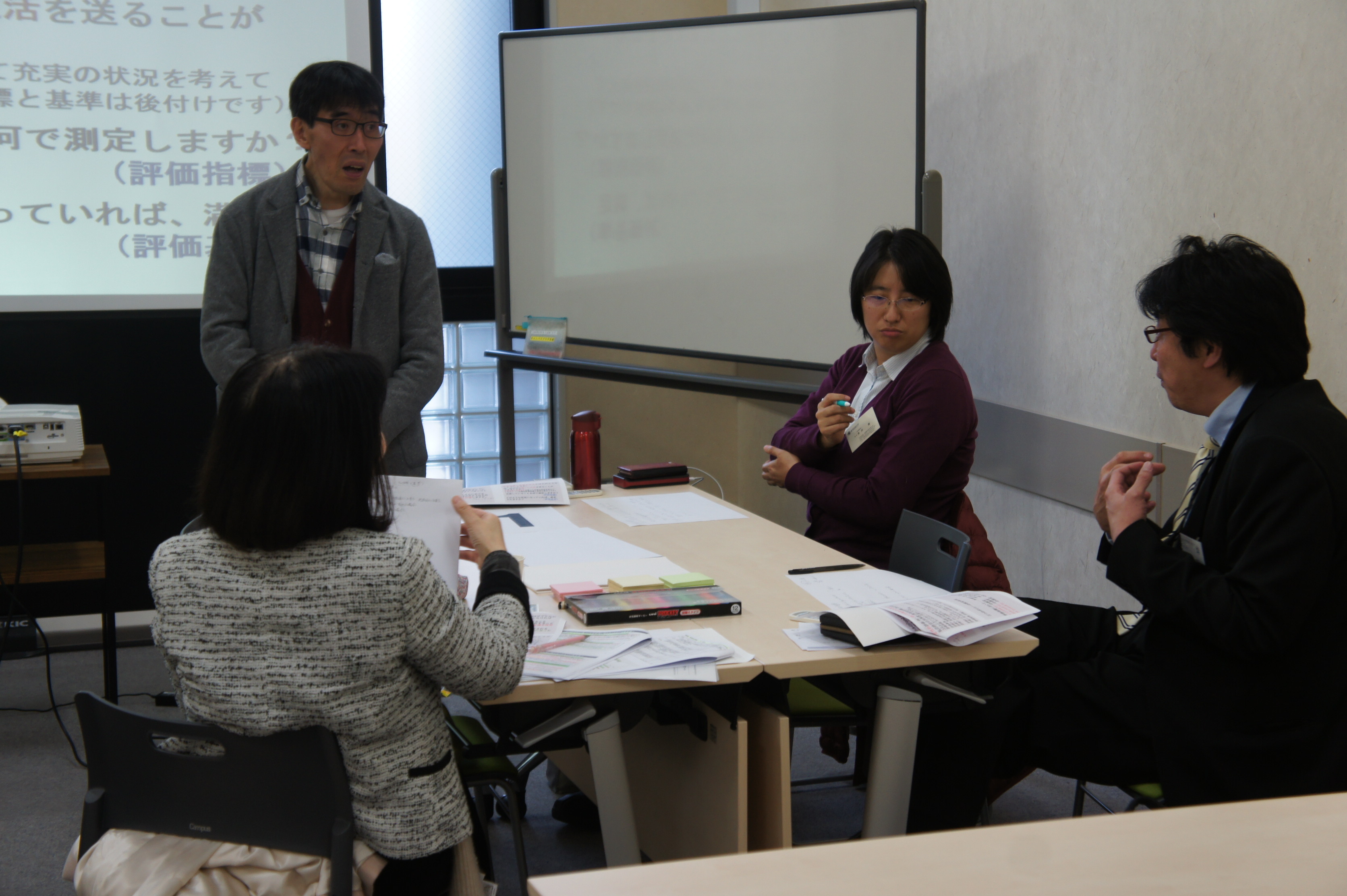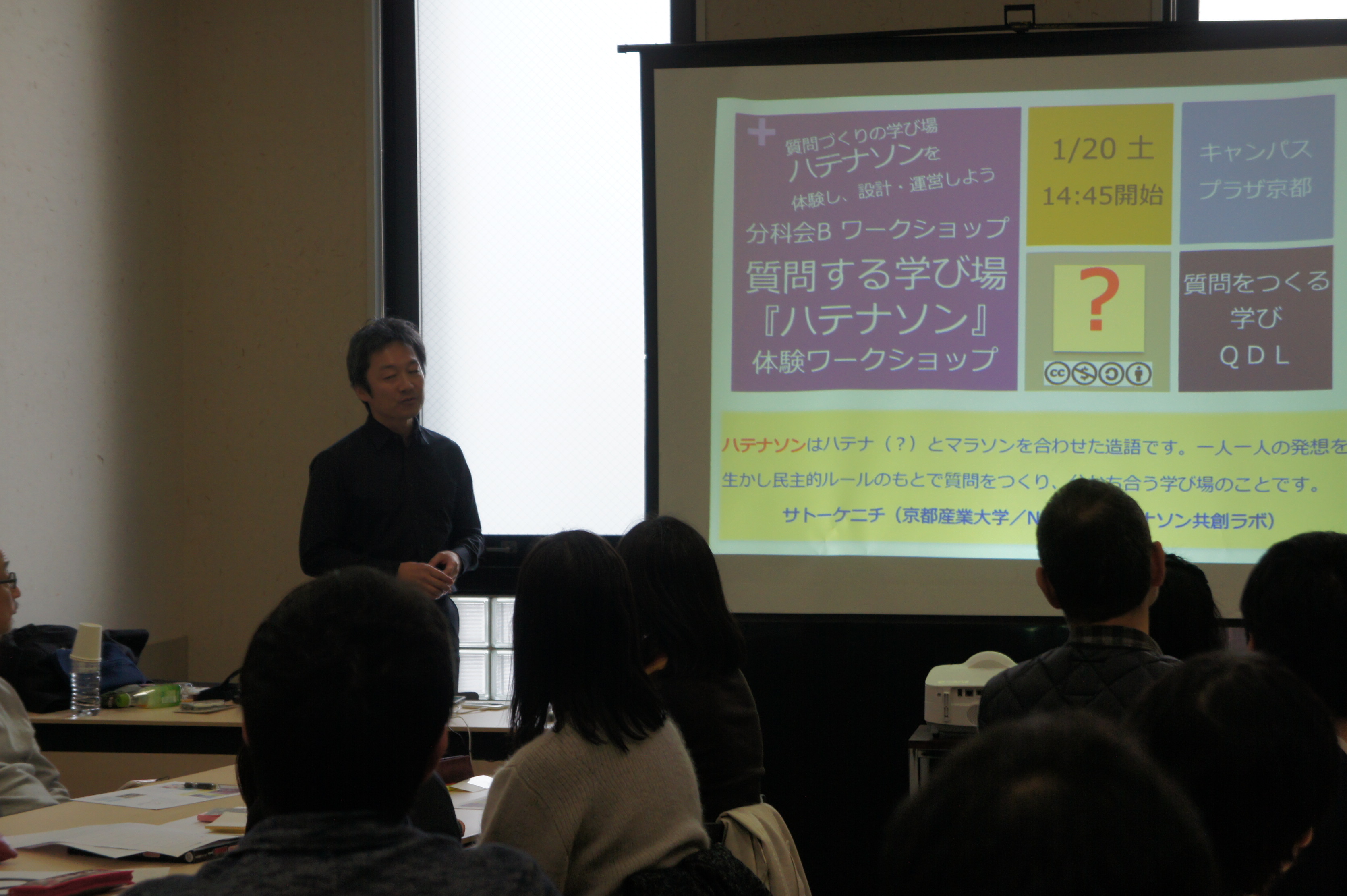Business Overview
As an organizational effort for faculty members to improve and enhance their teaching content and methods, the University Consortium Kyoto has been promoting FD activities in the Kyoto area together with member universities since 1995, shortly after its establishment.
The University Education Power-up Seminar was established in 2014 as a workshop-style study session that deals with a wide range of themes that are useful for the educational (educational support) activities of individual university faculty and staff.
Outline of the event
(In 2017, it will be held as a joint project with the University Education Power-up Seminar.)
In 2017, as in 2016, it will be held jointly with the University Education Power-up Seminar.
2017 Kyoto FDer Juku × University Education Power-up Seminar Joint Project
Theme: “Thinking about Quality Assurance in Education ~Toward a Qualitative Transformation and Improvement of Education with an Awareness of the Three Policies~”
Each university is required to make a qualitative transformation in education by realizing university education based on the “Three Policies”, and in 2017, it became mandatory to formulate and publish the “Three Policies” as consistent and consistent. In addition, in the third phase of the certification evaluation, the establishment of internal quality assurance will be an important item.
Under these circumstances, it is urgent for universities to review the “three policies” and develop and implement a system for establishing a PDCA cycle based on these policies. However, it is essential to disseminate understanding among individual faculty and staff and to work to transform and improve the quality of education at the field level.
In the keynote speech, he will give a lecture on the background and purpose of why the “three policies” are emphasized as the starting point of quality assurance, and at the breakout session, he will introduce case studies and workshops that are working to ensure and improve the quality of education at the middle and micro levels.
- Date
- Saturday, January 20, 2018 13:00~16:45
- Venue
- Campus Plaza Kyoto, 5th floor, Lecture Room 1, etc.
- Organizer
- University Consortium Kyoto
- Target
- University faculty, staff, and other university officials
- Participation Fee
- For member schools: Free
Non-member schools: ¥1,000 (please pay at the reception on the day) - Occupancy
- Keynote speeches: 140
Breakout Session A: 100 people
Breakout Group B: 20 people
Breakout Session C: 20 people
*Applications will be accepted on a first-come, first-served basis. - Contents
- Information flyer [Click here for details]
| Keynote Speech 13:00~14:30 [Capacity: 140 people] |
“Trends in Higher Education Administration and University Education Reform Based on the ‘Three Policies'” Jun Tsukada (Specialist, University Promotion Division, Higher Education Bureau, Ministry of Education, Culture, Sports, Science and Technology) |
|
| ≪ Overview≫ This course provides an overview of the latest trends in higher education administration, such as the status of the high school-university connection reform and the status of discussions on future plans, and then explains the background, background, and content of university reform based on the “Three Policies”. |
||
| Breakout Sessions 14:45~16:45 【Capacity】 Session A: 100 Session B: 20 Subcommittee C: 20 |
minute department meeting A |
Case Studies |
| (1) Yamagata University “Quality assurance of education at Yamagata University and Efforts to strengthen IR functions” Shigeru Asano (Professor, Graduate School of Science, Yamagata University) ≪ Overview≫ Interest and expectations for institutional research (IR) among Japan university officials remain high. In particular, many universities are exploring the use of IR as there is a strong demand from outside the university to improve university education, such as understanding learning outcomes, ensuring the quality of education, and managing teaching. This report provides an overview of the research on IR in Japan and the United States that the rapporteur has been working on so far, and introduces efforts related to education quality assurance, including the formulation of three policies currently in practice, and practical examples for strengthening IR. |
||
| (2) Kyoto Tachibana University “Educational development starting from teachers’ awareness of problems -Aiming to establish the CAPD cycle-“ Takero Nishino (Educational Development Support Center, Kyoto Tachibana University/ Lecturer, Department of Business Administration, Faculty of Contemporary Business) ≪ Overview≫ At Kyoto Tachibana University, educational development is based on the awareness of problems among teachers in the field. It is more of a CAPD cycle than a PDCA. In this report, we will deal with multiple cases across the board, including examples of improvement of first-year education in the Department of Business Administration of the Faculty of Contemporary Business, examples of improvement of practical training evaluation in the Faculty of Nursing, improvement cases of lower-grade education in the Faculty of Letters, and improvement of education at the time of admission in the Faculty of International English. |
||
| minute department meeting B |
workshop | |
| “Experience workshop of ‘Hatenason’, a learning place to ask questions” Kenichi Sato (Professor, Faculty of Life Sciences, Kyoto Sangyo University/ Chairman of the Non-Profit Organization Hatena Son Co-Creation Lab) ≪ Overview≫ With the aim of sharing “cross-border learning” with the participants, participants will experience the “Hatenason” workshop, a learning place where questions are asked with the question-making method QFT (Question Formulation Technique) developed in the United States, and the “Hatenason” workshop. We plan and operate it with the goal of having participants bring home an image of designing and operating it themselves. In addition, we will report and share examples of classes at universities and high schools in Hatenason, training cases for faculty and business people at educational institutions, examples of workshops with the participation of the general public, and examples of use in study groups, academic conferences, forums, etc. |
||
| minute department meeting C |
workshop | |
| “Let’s experience what a plan in the PDCA cycle is! “ Kazuharu Abe (Professor, Faculty of Career Development, Kyoto Koka Women’s University) ≪ Overview≫ |
||
Implementation Report
On Saturday, January 20, 2018, we held a joint seminar on the power up of education × Kyoto FDer Juku University, “Thinking about Quality Assurance of Education ~Toward a Qualitative Transformation and Improvement of Education with an Awareness of the Three Policies~”.
This time, with the aim of broadening understanding of the purpose and background of university education reform based on the three policies and linking it to educational reform at each university, we have set the overall theme of “Thinking about the quality assurance of education ~ Toward a qualitative transformation and improvement of education with an awareness of the three policies ~” with the aim of broadening understanding of the purpose and background of the reform of university education and linking it to the educational reform of each university.
In the keynote speech, Mr. Jun Tsukada, Specialist in the University Promotion Division of the Higher Education Bureau of the Ministry of Education, Culture, Sports, Science and Technology, gave a lecture titled “Trends in Higher Education Administration and University Education Reform Based on the ‘Three Policies’.”
He gave an overview of the background and purpose of the reform of university education based on the three policies, and then explained the latest trends in higher education administration, such as the progress of deliberations by the Future Planning Subcommittee of the Chukyo University Subcommittee and the status of deliberations related to the provision of free higher education.
In the second half, three subcommittees were held at the same time, and in Session A, two universities introduced examples of how to ensure and improve the quality of education. First, Mr. Shigeru Asano, a professor at the Faculty of Academic Studies, Yamagata University, spoke about the development of an IR system for quality assurance of education and the actual status of initiatives, followed by Mr. Takero Nishino, a lecturer at the Center for Educational Development Support, Kyoto Tachibana University, who talked about efforts to improve education from the perspective of the “CAPD cycle.”
Subcommittees B and C were held as a power-up seminar on university education, and in Session B, Mr. Kenichi Sato, a professor at the Faculty of Integrated Life Sciences, Kyoto Sangyo University, gave a hands-on workshop on the “Hatenathon,” a learning place where students asked questions, and in Session C, Mr. Kazuharu Abe, a professor at the Faculty of Career Development, Kyoto Koka Women’s University, gave a hands-on workshop on formulating a plan for the PDCA cycle.
In the participant questionnaire after the meeting, the overall satisfaction rate was about 84%, and the satisfaction of subcommittees B and C was particularly meaningful, with all respondents answering “satisfied” or “somewhat satisfied.”
In addition, we received many positive comments such as “It was good to feel the enthusiasm of the young speakers” and “It was helpful to learn about the trends of the government and examples of advanced initiatives regarding the quality assurance of education, which is the theme of education.”
Inquiries
University Consortium Kyoto FD Project
TEL 075-353-9163 FAX 075-353-9101
〒600-8216 Shimogyo-ku, Kyoto-shi, Nishitoin-dori, Shiokoji, Shimo-ku, Kyoto, Campus Plaza Kyoto
* Business hours: Tuesday ~ Saturday 9:00 ~ 17:00 (excluding year-end and New Year holidays)














